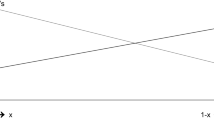Summary
We consider the problem of fairly allocating an infinitely divisible commodity among agents with single-peaked preferences. First, we examine the implications of the requirement that a change in the population affect all agents that are present before and after the change in the same direction. We show that this requirement is met by no selection from the no-envy solution. In the face of this impossibility, we limit our attention to changes that are not so “disruptive”, in the following sense: if initially there is not enough to bring all agents to their satiation points, then this still is the case after the change, and if initially there is so much that agents have to be brought beyond their satiation points, then again, this remains the case. The requirement is that such changes affect all agents that are present before and after the change in the same direction. Our main result is that there is essentially only one selection from the envy-free and efficient solution satisfying this property. It is the solution known as the “uniform” rule.
Similar content being viewed by others
References
Alkan, A.: Monotonicity and fair assignments. Bogaziçi University Discussion paper ISS/AD 89-04, 1989
Baumol, W.: Superfairness. M.I.T. Press 1986
Bevia, C.: Equal split guarantee solution in economies with indivisible goods; consistency and population monotonicity. University of Alicante mimeo, 1992
Chichilnisky, G., Thomson, W.: The Walrasian mechanism from equal division is not monotonic with respect to variations in the number of agents. J. Publ. Econ.32, 119–124 (1987)
Ching, S., Thomson, W.: Population monotonic solutions in public good economies with single-peaked preferences. University of Rochester mimeo, 1993
Chun, Y.: The solidarity axiom for quasi-linear social choice problems. Soc. Choice Welfare3, 297–320 (1986)
Chun, Y., Thomson, W.: Monotonicity properties of bargaining solutions when applied to economics. Math. Soc. Sci.15, 11–27 (1988)
Fleurbaey, M.: Three solutions for the compensation problem. INSEE mimeo, 1993
Foley, D.: Resource allocation and the public sector. Yale Econ. Essays7, 45–98 (1967)
Jones, R.: The population monotonicity property and the transfer paradox. J. Publ. Econ.32, 125–132 (1987)
Kolpin, V.: Equity and the core. Math. Soc. Sci.22, 137–150 (1990)
Mas-Colell, A.: Equilibrium theory with possibly satiated preferences. In: Majumdar, M. (ed.) Equilibrium and Dynamics. Essays in honour of D. Gale, pp. 201–213. London: McMillan, 1992
Manelli, A.: Core convergence without monotone preferences and free disposal. J. Econ. Theory55, 400–415 (1991)
Moulin, H.: Interpreting common ownership. Rech. Econ. Louvain56, 3–4 (1990a)
Moulin, H.: Cores and large cores when population varies. Int. J. Game Theory19, 219–232 (1990b)
Moulin, H.: Fair division with money: two interpretations of common ownership. Duke University mimeo, 1990c
Moulin, H.: An application of the Shapley value to fair division with money. Econometrica60, 1331–1349 (1992)
Polemarchakis, H., Siconolfi, P.: The existence of competitive equilibria without free disposal or nonsatiation. J. Math. Econ.22, 85–99 (1993)
Sprumont, Y.: Population monotonic allocation schemes for cooperative games with transferable utility. Games Econ. Behavior2, 378–394 (1990)
Sprumont, Y.: The division problem with single-peaked preferences: A characterization of the uniform allocation rule. Econometrica59, 509–519 (1991)
Tadenuma, K., Thomson, W.: Solutions to the problem of fair allocation in economies with indivisible goods. University of Rochester mimeo, 1992
Tadenuma, K., Thomson, W.: The fair allocation of an indivisible good when monetary compensations are possible. Math. Soc. Sci.25, 117–132 (1993)
Thomson, W.: On allocations attainable through Nash equilibrium: A comment. In: Laffont, J. J., (ed.) Aggregation and revelation of preferences, pp. 420–431. Amsterdam: North-Holland 1979
Thomson, W.: The fair division of a fixed supply among a growing population. Math. Operat. Res.8, 319–326 (1983)
Thomson, W.: Problems of fair division and the egalitarian solution. J. Econ. Theory31, 211–226 (1983)
Thomson, W.: Monotonic allocation rules. University of Rochester DP, 1987a (revised May 1993)
Thomson, W.: Monotonic allocation rules in public good economies. University of Rochester DP, 1987b (revised May 1993)
Thomson, W.: Consistent solutions to the problem of fair division when preferences are single-peaked. J. Econ. Theory, forthcoming
Thomson, W.: Resource-monotonic solutions to the problem of fair division when preferences are single-peaked. Social Choice and Welfare, forthcoming
Thomson, W.: Fair allocation rules. University of Rochester, mimeo, 1993a
Thomson, W.: Population-monotonic allocation rules. University of Rochester, mimeo, 1993b
Author information
Authors and Affiliations
Additional information
The comments of T. Yamato, T. Sönmez and two referees, and support from NSF under Grant No. 8809822 and SES 9212557, are gratefully acknowledged.
Rights and permissions
About this article
Cite this article
Thomson, W. Population-monotonic solutions to the problem of fair division when preferences are single-peaked. Econ Theory 5, 229–246 (1995). https://doi.org/10.1007/BF01215201
Received:
Revised:
Issue Date:
DOI: https://doi.org/10.1007/BF01215201




